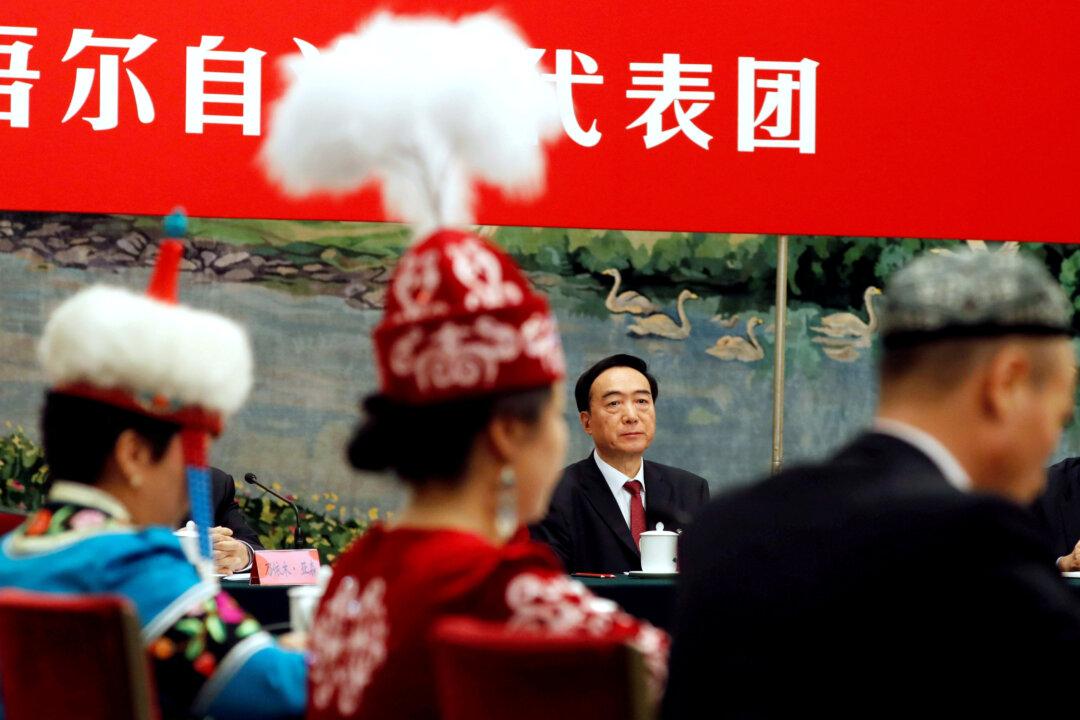BEIJING—A group of 15 Western ambassadors in Beijing, spearheaded by Canada, are seeking a meeting with the top official in China’s restive, heavily Muslim Xinjiang region for an explanation of alleged rights abuses against ethnic Uyghurs.
The envoys are making their request in a letter to Chen Quanguo, Xinjiang’s Communist Party boss, according to a copy of a draft letter seen by Reuters.
The move represents unusually broad, coordinated action by a group of countries over a human rights issue in China, and illustrates the mounting backlash Beijing is facing over its crackdown in the western region.
Beijing has faced an outcry from activists, academics, foreign governments and U.N. rights experts over mass detentions and strict surveillance of the mostly Muslim Uyghur minority and other Muslim groups who call Xinjiang home.
In August, a United Nations human rights panel said it had received many credible reports that a million or more Uyghurs in China are being held in what resembles a “massive internment camp that is shrouded in secrecy.”
China says it is not enforcing arbitrary detention and political re-education, but rather some citizens guilty of minor offenses were being sent to vocational centers to provide employment opportunities.
However, a report published on Nov. 5 by U.S. think-tank the Jamestown Foundation found that despite the purported large “vocational training” campaign, employment outcomes had not markedly improved, according to Xinjiang’s own official employment figures.
“Xinjiang’s budget figures do not reflect increased spending on vocational education…Rather, they reflect patterns of spending consistent with the construction and operation of highly secure political re-education camps designed to imprison hundreds of thousands of Uyghurs with minimal due process,” said the report’s author, Adrian Zenz, an anthropologist at the European School of Culture and Theology in Germany.
It was not clear if the letter had been sent yet or if it contents could be revised. One diplomatic source said it was being passed around for more countries to potentially sign.
Several other diplomats familiar with the letter would only confirm its existence and refused to discuss it further, citing its sensitivity. All of the diplomats declined to be identified.
‘We are Deeply Troubled’
In the draft letter addressed directly to Chen, who outranks the region’s ethnic Uyghur governor Shohrat Zakir, the ambassadors said they were highly concerned by the U.N. findings on Xinjiang.“We are deeply troubled by reports of the treatment of ethnic minorities, in particular individuals of Uyghur ethnicity, in the Xinjiang Uyghur Autonomous Region,” the draft reads.
“In order to better understand the situation, we request a meeting with you at your earliest convenience to discuss these concerns.”
The letter is copied to China’s Foreign Ministry, the Ministry of Public Security and the Communist Party’s international department.
It is not possible to directly contact any senior Chinese leader for comment.
The Xinjiang government, Ministry of Public Security, the party’s international department and party’s spokesman’s office did not respond to requests for comment.
The Chinese regime has used the excuse that Xinjiang faces a serious threat from Islamist militants and separatists who plot attacks and stir up tensions with the ethnic Han Chinese majority to crack down on the local population in Xinjiang.
The letter carries the names of 15 Western ambassadors, including the Canadian, British, French, Swiss, European Union, German, Dutch and Australian envoys. The other countries’ ambassadors names in the letter are Ireland, Sweden, Belgium, Norway, Estonia, Finland and Denmark.
Four diplomats familiar with the letter and its contents said Canada had taken the lead in its drafting.
Canada’s Foreign Ministry, in a statement sent to Reuters, did not comment directly on the letter but expressed deep concern over the reports of detention and mass surveillance of Uyghurs and other Muslims in Xinjiang.
“The Minister of Foreign Affairs raised the situation faced by the Uyghurs directly with China’s Foreign Minister at the UN General Assembly. Canada regularly raises concerns about Xinjiang with Chinese authorities both publicly and privately, bilaterally and multilaterally, and will continue to do so.”
The EU, British, German, Swedish, Swiss, Belgian, Dutch, Finnish and Norwegian embassies declined to comment on the letter.
The Australian Department of Foreign Affairs and Trade said the government was concerned about the situation in Xinjiang and officials had conveyed these concerns to China on a number of occasions.
The Irish, Danish, French and Estonian embassies did not respond to requests for comment.
The United States is not represented on the letter, although non-U.S. diplomats say the country has been deeply involved in advocacy on the Xinjiang issue.
“We remain alarmed that since April 2017 the Chinese government has detained an estimated 800,000 to possibly more than 2 million Uyghurs, Kazaks and other Muslims in internment camps for political re-education,” a U.S. embassy spokesman said, responding to a question regarding the letter.
“The United States will continue to call on China to end these counterproductive policies and free all those arbitrarily detained. We are committed to promoting accountability for those who commit human rights violations and abuses, including by considering targeted measures against Xinjiang officials.”
The United States has said it is considering sanctions against Chen, other officials and Chinese companies linked to allegations of rights abuses in Xinjiang.





